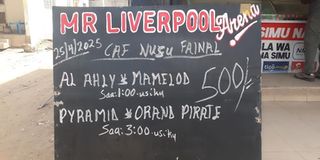OUR KIND ENGLISH: Fountain weren’t defeated AGAINST Yanga; they were defeated BY Yanga

The four football teams that battled it out in the CAF Champions League semifinals on April 25 were Al Ahly vs MAMELODI (not Mamelod) Sundowns and PYRAMIDS (not Pyramid) vs ORLANDO PIRATES (not Orand Pirate) FC. Trust Signwriters! PHOTO | AMS
What you need to know:
- Even though media practitioners say “one gets away with murder” in headline writing, I aver that if we’re referring to persons that are sidelined, dropping article “the” before is abusing our licence to murder! I suggest the headline should read, ‘…makes scant difference for THE excluded,’ OR, ‘…for excluded PERSONS.’ Not just “for excluded.”
Our bag of linguistic gems is so full we’ll skip our usual introductory blah-blah and move straight to the key assignment of dishing out to you, the reader, what we picked from the Bongo English press during the past week. So, here we go…
The leading story on the Back Page of the tabloid closely associated with this columnist (Friday, April 25 edition), is entitled ‘Simba brace for CAF, crucial premiership assignments’. To add colour to the story is photo whose caption reads: “Simba players train in ONE OF the GYM in Durban ahead of SUNDAY CAF Confederation (sic!) match against Stellenbosch at the Moses Mabhida Stadium.”
One of the gym? No sir; you cannot have one of a single thing. What you may have is one of many things. From our Kiswahili counterparts stories we often come across nonsensical expressions like, “Huyu ni MMOJA wa MCHEZAJI ambaye anafaa kuwa winga wa kushoto.” That, instead of, “Huyu ni mmoja wa WACHEZAJI AMBAO WANAFAA kuwa MAWINGA wa kushoto.”
In regard to the Simba caption above, we aver, our scribbling colleague should have written it thus: “Simba players train at ONE OF the GYMS (not gym) in Durban ahead of SUNDAY’S (not Sunday) CAF Confederation CUP match against Stellenbosch at the Moses Mabhida Stadium.” OR: “Simba players train at A GYM in Durban ahead of SUNDAY’S CAF Confederation CUP match….”
Let’s look at Page 20 of Bongo’s huge and colourful broadsheet of Wednesday, April 23, that’s carrying a story with the headline, ‘Matano blames Noble for heavy defeat AGAINST Yanga’.
Defeat “against” Yanga? No way, siree! We say “…defeat BY Yanga.” If the headline scribbler felt strongly obliged to use the preposition “against,” he should have written something like: ‘Matano claims Noble to blame in
Yanga’s win AGAINST Fountain.’
The Friday, April 25 edition of the title that ran the Matano claims story we cite above had Page 8 piece entitled, ‘Access to codes of law makes scant difference for excluded’.
Even though media practitioners say “one gets away with murder” in headline writing, I aver that if we’re referring to persons that are sidelined, dropping article “the” before is abusing our licence to murder! I suggest the headline should read, ‘…makes scant difference for THE excluded,’ OR, ‘…for excluded PERSONS.’ Not just “for excluded.”
In Para 3, the opinion scribbler says: “The new edition of the laws is DOUBTLESS a big boost for the professionals in the legal sector, especially magistrates and lawyers…”
Without doubt, we’ll state that our colleague messes up grammar by saying “doubtless…” instead of DOUBTLESSLY…
Finally, we’ll pick something from Page 8 of Bongo’s senior-most broadsheet of Saturday, April 26, that’s carrying a story entitled, ‘Tanzanians cherish unmatched peace and tranquility’.
At the start of Leg 3 of his story, the scribbler purports to report what a Prof said about the Union and writes: “He said the HIGH vision of consistently consolidating the Union by putting all people at the centre of transformation has been translated into all government phases.”
Did the topmost academic really talk of “high” vision, which gives the impression that our people are heading for the skies, literally. We want to believe the scribbler had in mind the word “long;” yes; LONG vision! That is, maono ya mbali in Kiswahili. High vision would mean maono ya juu, which would be a meaningless expression, wouldn’t it?
In the same leg of the story, the scribbler reports his esteemed source as calling on “leaders and CITIZENS to embrace political tolerance…”
Hello; kwani, are leaders of our Union not citizens too, like the rest us, the minions? They definitely are! We suppose the good Prof spoke of “leaders and ORDINARY citizens”.
Ah, this treacherous language called English!





